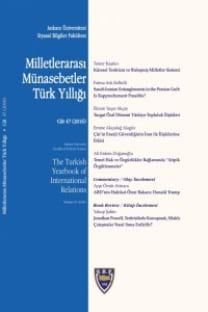From the Ottoman Experiment in Local Government to the First Constitutional Parliament of 1876-1877
Ottoman Experiment, Local Government, First Constitutional Parliament
From the Ottoman Experiment in Local Government to the First Constitutional Parliament of 1876-1877
- ISSN: 0544-1943
- Yayın Aralığı: 1
- Başlangıç: 1960
- Yayıncı: Ankara Üniversitesi Siyasal Bilgiler Fakültesi Uluslararası İlişkiler Bölümü
Double Standards in Recent American Foreign Policy
The Etiology of Racism in Europe
Mehmet SUPHİ, Abdülkadir ÇELİK, Birsen CEYHUN
The Role of the Muslim Minorities in Interstate Relations in the Balkans
From the Ottoman Experiment in Local Government to the First Constitutional Parliament of 1876-1877
The Development Paradigm: Sustainable Human Development
The Question of Jerusalem in the Cold-War Era
Struggle for East-European Empire: 1400-1700
The Rise and Fall of the Wealth of Nations
Political Attitudes of Students in the United States Turkey and Turkey and North Cyprus
